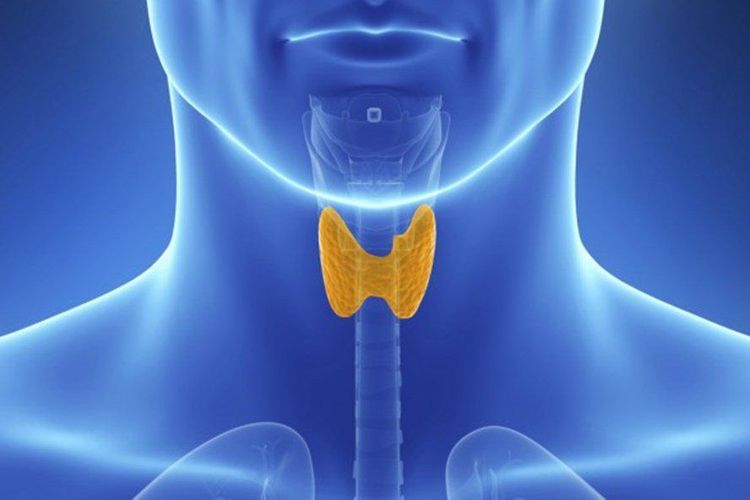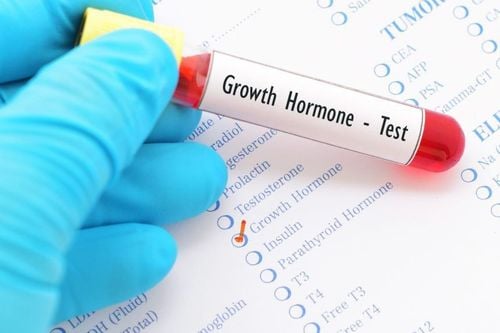Chức năng tuyến giáp không chỉ chịu ảnh hưởng bởi tuyến giáp mà còn bởi tuyến yên (một tuyến sản xuất ra ra hormone kích thích tuyến giáp gọi là TSH). Khi chẩn đoán bệnh lý tuyến giáp được chỉ định thực hiện tổng thể nhiều loại xét nghiệm kết hợp.
1. Mục đích xét nghiệm hormon tuyến giáp
Tuyến giáp có nhiệm vụ tiết ra 2 hormon chính là thyroxine (T4) và Triiodothyronine (T3). Lượng hormon T4 và T3 do tuyến giáp tiết ra sẽ được điều hòa bởi hormone kích thích tuyến giáp là TSH của tuyến yên. Khi muốn xác định bệnh lý tuyến giáp thì cần tiến hành đồng thời xét nghiệm chức năng tuyến giáp gồm: TSH, fT4, fT3.
Mục đích tiến hành các xét nghiệm hormon tuyến giáp, đồng thời với các xét nghiệm liên quan là để chẩn đoán xem tuyến giáp có hoạt động như bình thường hay không, đồng thời xét nghiệm này cũng rất có ý nghĩa trong chẩn đoán các bệnh lý tuyến giáp và nguyên nhân nguồn gốc của các rối loạn đó để đưa ra những tư vấn và điều trị kịp thời.

2. Chỉ số TSH và T3, T4 bình thường
TSH là một hormone tuyến yên mang tín hiệu đến cho tuyến giáp. Trường hợp tuyến yên phát hiện có ít hormone tuyến giáp trong máu thì nó sẽ sản xuất ra nhiều TSH để kích thích quá trình thúc đẩy tuyến giáp sản xuất ra nhiều hormone tuyến giáp hơn. Ngược lại, nếu tuyến yên phát hiện có quá nhiều hormone tuyến giáp thì nó sẽ giảm sản xuất TSH và kéo theo tuyến giáp cũng giảm sản xuất hormone giáp.
Xét nghiệm TSH có thể được sử dụng đồng thời với xét nghiệm FT4 hoặc đôi khi là xét nghiệm FT3 để chẩn đoán bệnh lý tuyến giáp bị rối loạn và theo dõi liệu pháp thay thế tuyến giáp ở người bệnh bị suy giáp, hoặc theo dõi điều trị ở người bệnh bị cường giáp và đôi khi tiến hành xét nghiệm để đánh giá chức năng của tuyến yên.
Triiodothyronine (T3) là hormon nội tiết tố có chức năng chịu trách nhiệm chính cho sự phát triển các tác động của nội tiết tố tuyến giáp lên các cơ quan đích khác nhau. Hormon T3 chủ yếu được tạo ra bên ngoài tuyến giáp, đặc biệt là ở gan bởi phản ứng khử iod ở vị trí 5' của T4 bằng men. Chính vì thế, nồng độ hormon T3 có trong huyết thanh sẽ phản ánh tình trạng chức năng của mô ngoại biên hơn là khả năng tiết ra tuyến giáp.
Hormon tuyến giáp thyroxine (T4) chính là thành phần sinh lý của vòng điều hòa tuyến giáp và có vai trò tác động trên chuyển hóa chung của cơ thể. Thyroxine tự do (fT4) có hoạt tính sinh học. Xét nghiệm định lượng thyroxine tự do rất quan trọng trong chẩn đoán lâm sàng thường quy và cũng thích hợp để theo dõi điều trị ức chế tuyến giáp.
Giá trị sinh học bình thường:
- Chỉ số TSH bình thường nếu kết quả trong phạm vi từ 0,4 đến 5 mIU/L (milli-đơn vị quốc tế mỗi lít).
- Chỉ số T3 T4 bình thường (đối với người trưởng thành) khi hormon T3 đạt mức 1.3 – 3.1 nmol/l hoặc 0.8-2.0 ng/ml. Các trị số của T3 sẽ tăng giảm tương ứng với T4, tuy nhiên, ở một số trường hợp (bệnh nhiễm độc tuyến giáp do T3) thì T3 tăng nhưng T4 lại bình thường.
- Chỉ số FT4 bình thường (đối với người trưởng thành) khi đạt mức 12- 22 pmol/l (0.93-1.7 ng/dL). Nếu bệnh nhân không sử dụng bất kỳ loại thuốc tuyến giáp nào thì xét nghiệm này sẽ là một thước đo để đánh giá về chức năng của tuyến giáp. Một số loại thuốc có thể làm thay đổi kết quả T4 như: thuốc động kinh, thuốc tim mạch, hoặc aspirin...
Khi người bệnh mắc suy giáp và tuyến giáp hoạt động không hiệu quả thì TSH sẽ có trở nên cao mặc dù nồng độ T3 T4 bình thường. TSH sẽ tăng khi hormon tuyến giáp lưu hành thấp, đây là một dấu hiệu cho thấy chức năng tuyến yên bị suy giảm.
Tóm lại, tuyến giáp là một trong những bộ phận rất quan trọng, đóng vai trò giải phóng các hormon cho chu trình hoạt động của cơ thể. Mặc dù có kích thước rất nhỏ nhưng tuyến giáp lại là bộ phận quan trọng và dễ bị vi khuẩn, virus xâm nhập gây ra tình trạng viêm nhiễm, gây ảnh hưởng tới sức khỏe người bệnh.
Trên thực tế, các bệnh lý tuyến giáp thường bị bỏ sót và không được chẩn đoán sớm, chiếm khoảng 20-60% trong tổng số người mắc bệnh. Điều này đã khiến cho việc thăm khám và điều trị ít hiệu quả hơn, thậm chí nhiều người khi phát hiện thì bệnh đã bước sang giai đoạn nặng hơn và đối mặt với những biến chứng nguy hiểm. Do đó, mỗi người nên tự tìm hiểu các kiến thức về bệnh lý tuyến giáp để có biện pháp phòng ngừa hiệu quả, tầm soát bệnh an toàn.

Để đặt lịch khám tại viện, Quý khách vui lòng bấm số HOTLINE hoặc đặt lịch trực tiếp TẠI ĐÂY. Tải và đặt lịch khám tự động trên ứng dụng MyVinmec để quản lý, theo dõi lịch và đặt hẹn mọi lúc mọi nơi ngay trên ứng dụng.
Để đặt lịch khám tại viện, Quý khách vui lòng bấm số HOTLINE hoặc đặt lịch trực tiếp TẠI ĐÂY. Tải và đặt lịch khám tự động trên ứng dụng MyVinmec để quản lý, theo dõi lịch và đặt hẹn mọi lúc mọi nơi ngay trên ứng dụng.





